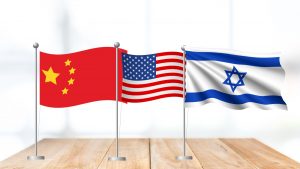Publications
Special Publication, August 8, 2022
Initial contacts between Israel and the People’s Republic of China began in the early 1950s. In theory, diplomatic relations between the two countries could have been formed long before 1992, when they actually began. We asked Prof. Yitzhak Shichor, one of the leading and most experienced scholars in Israel on the subject of China, how relations were formulated, what prompted them, and what delayed them. In addition to bilateral interests, a number of trilateral factors have shaped Chinese and Israeli considerations, and affected their relations over the years, including Russia, Arab and Islamic countries, Iran, and the Palestinians. Nevertheless, it is Prof. Shichor’s firm opinion that the main factor has been the United States, which, reflecting its own interests, tried mostly to keep the two countries apart, contributing, just for a while, to the improvement of relations between Israel and China.

The State of Israel and the People’s Republic of China are almost the same age (Israel was established in May 1948, while the People’s Republic of China was established in October 1949). Prof. Yitzhak Shichor notes that at first glance, the two young countries appeared to share some characteristics that could have served as a basis for warm relations between them – at least until the early 1950s. Leaning on a socialist ideology, both received political and military support from the Soviet Union. Geographically remote from each other, they never had territorial disputes, nor was there antisemitism in China. Initially, Chinese communism appreciated Zionism as an anti-imperialist "liberation movement." Indeed, on January 9, 1950, Israel officially recognized the People’s Republic of China, becoming the first country in the Middle East and the seventh in the non-communist world to do so.
If so, what went wrong? While the United States continued to recognize the Republic of China on Taiwan as China's legitimate government, and with the Cold War and the Korean War in the background, Washington urged Israel to refrain from forging relations with China, even using threats. Shichor adds that Beijing also had doubts, and Soviet documents show that as early as July 1951, Chinese Prime Minister and Foreign Minister Zhou Enlai told the Soviet ambassador to China that China would not establish diplomatic relations with Israel, anticipating that such relations would harm China's prospects of forming relations with other countries. Neither Israel nor the United States was aware of this Chinese view.
Chinese hesitation about relations with Israel turned into hostility in the following years, even though Israel was still interested in relations and usually abstained in UN votes on China’s admission. Shichor explains, however, that despite the absence of official relations, there were sporadic unofficial diplomatic and other exchanges between the two countries in the 1950s. As the Sino-Soviet conflict was escalating in the 1960s, China became impressed with Israel's military capabilities. By that time, Beijing had also become disappointed with the fragmentation among the Palestinian organizations, which abandoned Mao’s-style "people's war" doctrines in favor of terrorism with Soviet backing.
Israel-China relations began to thaw toward the late 1970s and throughout the 1980s. Shichor attributes the improvement to better relations between China and the United States and to the admission of China in 1971, with Israel's support, as a member to the United Nations in place of Taiwan. According to Shichor, Israel began selling arms and military technology to China in the 1980s, apparently with US encouragement and perhaps even at its initiative, in order to strengthen China against the Soviet Union, US enemy in the Cold War. Sino-Israeli informal ties began in agriculture, science, tourism, and communications and, more important, in foreign minister meetings at the annual UN General Assembly. In 1989, China established a “tourism” office in Tel Aviv, and Israel an “Academy of Sciences” office in Beijing. Although unofficial, each was led by a seasoned diplomat.
Among the reasons for these improved relations, Shichor notes the removal of US opposition, especially after Washington itself established relations with Beijing in 1979; the signing of the Israel-Egypt peace treaty; a common interest in thwarting Soviet penetration of the Middle East; and post-Mao China's emphasis on economic and technological development, based on its growing integration with the international community. While Beijing’s decision to establish diplomatic relations with Israel had been made in the late 1980s, the timing was dictated by two later events. The first was Israel's decision not to respond to the Iraqi missile attack against it in January 1991, which prevented escalation that would have damaged Chinese economic interests in the Middle East. The second was the Madrid Conference in late 1991, which led to the establishment of five multilateral working groups to address matters of regional security, economic cooperation, refugees, the environment, and water resources. According to Shichor, China wanted to participate in some of these groups but was unable to do so because it had no relations with Israel. This finally led to the inaugurating of diplomatic relations on January 24, 1992.
Trade between the two sides soared in the following years, from $50 million in 1992 to over $1 billion in 2001. A decade later, bilateral trade already exceeded $8 billion, and neared $15 billion in 2021. On the other hand, already in the early 1990s, the US growing hostility to China resulted in a crisis in Israel-China relations involving defense exports, after the United States demanded that Israel withdraw from its agreements to supply China with a Phalcon system (a surveillance and early warning plane) and to upgrade China's Harpy UAVs. Following these transactions, the United States forced Israel to impose barriers to military ties with China. Initially, however, Sino-Israeli economic relations were almost unaffected – reflecting the separation between politics and economics. Indeed, Chinese investments in Israel began to grow in 2013, as did ties in science and technology, in higher education and culture, and even in internal security, such as in the 2008 Olympic Games and anti-terrorism warfare in cooperation with the Chinese People's Armed Police (PAP). Shichor indicates that in the following years, US pressure on Israel to stop its defense exports to China extended to other areas, particularly to Chinese investments in infrastructure and in Israeli companies.
Other factors that supposedly cast a shadow on Israel-China relations are China's association with Iran, which calls for Israel's destruction; Beijing's decades of support for the Palestinians; and the pattern of China's votes in the UN and international organizations – never for Israel. Shichor, however, does not believe that Israel has much to worry about in this context. As for Iran, he doubts China's support for Iran's nuclear program, and says that Beijing would prefer that Iran avoids developing nuclear capability that would push other regional countries (mainly Saudi Arabia and Turkey) into pursuing similar programs. Shichor also argues that Chinese influence on Iran is smaller than generally assumed, and that Iran uses China, and vice versa, primarily as a tool for provoking the United States. He also notes that Iran's behavior in the region, including inciting Islamic extremism, supporting terrorism, threatening oil shipments through the Strait of Hormuz, and contributing to regional instability clearly undermine Chinese interests. Shichor underrates the Iran-China 25-Year Comprehensive Cooperation Agreement signed by China and Iran in March 2021, which aroused negative reactions in Israel and worldwide. He asserts that the agreement, whose main purpose is public relations propaganda, is legally limited. In addition, even if the agreement becomes a binding contract, history shows that Iran canceled several contracts signed with China in its energy sector. He adds that 25 years is a long time, and future events are unpredictable. Nevertheless, Shichor agrees that if there are signs in the future that China is prepared to send arms to Iran under this defense agreement, it will constitute a breach of the understandings between China and Israel, in which case Israel can threaten to renew arms supply to Taiwan as a countermeasure.
Shichor also holds that Chinese voting in international organizations on Palestinian issues, never in favor of Israel, is one of China’s last means to cling to its “revolutionary character." He mentions comments by a Chinese source, who said that China did not support Israel on international resolutions because they are mostly inconsequential, while still enabling China to argue that it supports the Arabs and the Palestinians. Shichor says that notwithstanding this symbolic support, "The gap between China's ties with the Palestinians and its ties with Israel is huge." He further states that several countries regarded as friendly to Israel, especially in Europe, but not only there, have adopted an anti-Israel policy over the years, sometimes worse than China’s, and no one advocates downgrading relations with them.
Israel's main interest in China is economic, and China's interest in Israel reflects its own needs. While in the 1980s and 1990s China primarily needed military technologies from Israel, it is now looking in particular for technologies in agriculture, water, food, and health. He notes, however, that while the United States has intervened to prevent military cooperation between China and Israel since the early 1990s, it is now also criticizing Chinese investments in Israel in science, technology, and infrastructure. Much like in the post-1950s, he asserts, any change in Israel-China relations, for better or worse, is a result of the American interest. In this context, it is interesting to note that according to a special survey by the Israel Democracy Institute on the eve of President Biden's visit to Israel in July 2022, 57 percent of the Jews in Israel do not trust the Biden administration to take Israel's interests into account, as part of the overall US-Israel relationship.
Shichor is convinced that the United States is obsessed with the idea of the “China threat,” instead of regarding China as a potential partner. Shichor believes that American hostility to China is one of the biggest mistakes in Washington's foreign policy, and holds that the United States, unaware, has already lost this “competition.” Furthermore, he says that Israel can be a mediator between these two great powers, similar to the way that Jews were involved in the Chinese revolution, from the penetration of communism to Deng Xiaoping's reforms of appropriating capitalist economics. Through writing, translating, communicating, and advising, these Jews, American, European, or Russian, helped bridge the gap between China and the rest of the world. More recently, they offered the Chinese to combine socialism and capitalism, overturning Marx – an unprecedented experiment.
Shichor holds that Israel can initiate meetings with US influential intellectuals and officials to help Washington restore its brief (1969-1989) honeymoon with China. He says, however, that given the United States’ "anti-China fixation," such a meeting is unlikely to take place, let alone to succeed. Thus, Washington leaves Israel no choice but to maneuver between the two great powers. Shichor argues, however, that "Israel does not have to give in to the American dictates in the Chinese context." No doubt, the United States is Israel’s most important asset, but, he adds, "Israel is a sovereign country, and should make its own decisions." In his opinion, the main problem is not Israel, which has proved able to cope with similar constraints in the past, and could do it again. The main problem is the United States, which has repeatedly adopted the wrong policy on China for over a century, and has left China no choice but to fall in line, frequently unwillingly, first with the Soviet Union and later with Russia. This was the situation in the past, and so it is now. To summarize, Shichor quotes Prof. Daniel Pipes, who proposed (albeit in a different context) to "know-it-all US policy-makers… Instead of lecturing Israelis, Saudis, and others, they should start learning from them."
______________
* The authors thank Daniel Rakov and Tomer Barak for their helpful comments.



